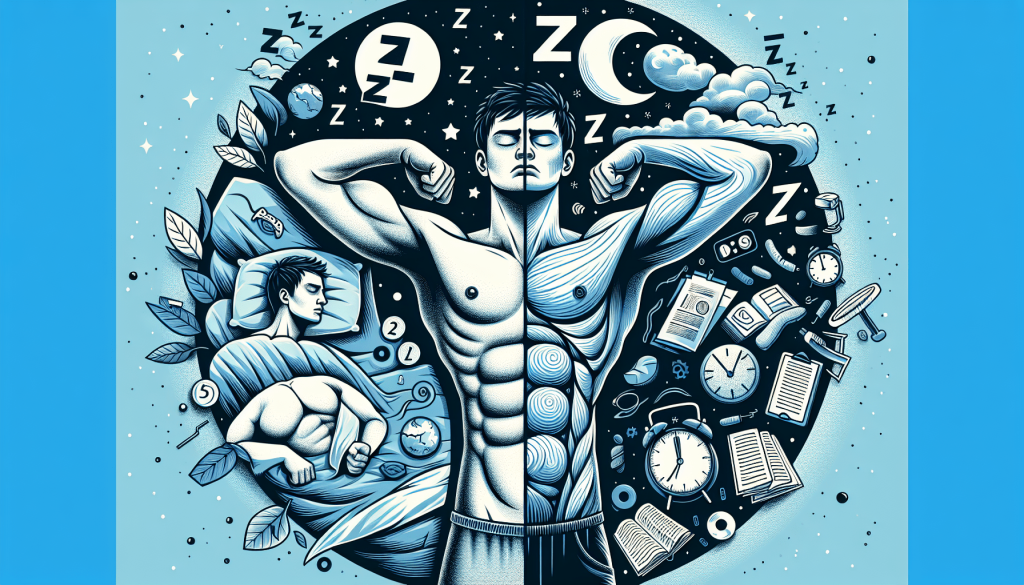If you’re someone who’s been putting in the effort at the gym, diligently working towards a chiseled six pack, you may be interested to know that there’s another factor at play when it comes to achieving your desired abdominal muscle development. The quality of your sleep. Yes, you read that right. Recent studies have shown that poor sleep quality can actually hinder the development of your coveted six pack abs. So, if you’ve been hitting the snooze button a little too often or struggling to get a good night’s sleep, it may be time to reevaluate your sleep habits and prioritize those Zzz’s for the sake of your sleek six pack.
What is poor sleep quality?
Definition and causes
Poor sleep quality refers to the difficulty or inability to achieve and maintain a restful and rejuvenating sleep. It is characterized by disruptions in sleep patterns, such as difficulty falling asleep, frequent awakenings during the night, and early morning wakings. Poor sleep quality can be caused by various factors, including stress, anxiety, environmental factors, sleep disorders, and unhealthy lifestyle choices.
Effects on overall health
The impact of poor sleep quality extends beyond feeling groggy and fatigued during the day. Sleep is crucial for overall health, and consistently experiencing poor sleep quality can have detrimental effects on various aspects of our well-being. It can contribute to an increased risk of developing conditions such as obesity, diabetes, cardiovascular diseases, and mental health disorders. Additionally, poor sleep quality can weaken the immune system, impair cognitive function, and negatively affect mood and emotional well-being.
What are abdominal muscles?
Overview of abdominal muscles
Abdominal muscles, commonly referred to as abs, are a group of muscles located in the abdomen area. They play a crucial role in providing stability and support to the spine, facilitating proper posture and maintaining core strength. The abdominal muscles consist of several distinct muscles, including the rectus abdominis, external obliques, internal obliques, and transverse abdominis.
Functions of abdominal muscles
The primary function of abdominal muscles is to flex and rotate the trunk, aiding in activities such as bending forward, twisting, and maintaining balance. These muscles also assist in activities that involve pushing, pulling, and lifting. Besides their role in movement, well-developed abdominal muscles contribute to a flatter and more toned stomach appearance.

Importance of sleep for muscle development
Role of sleep in muscle repair and growth
Sleep plays a critical role in muscle repair and growth. During sleep, the body undergoes essential restorative processes, including the secretion of growth hormone, which is a key factor in muscle development. Adequate sleep allows the body to repair and rebuild damaged muscle tissues, regulate protein synthesis, and replenish energy stores. Quality sleep is crucial for optimizing these recovery processes, leading to enhanced muscle strength and growth.
Effects of sleep deprivation on muscle development
Insufficient or poor-quality sleep can hinder muscle development and undermine the efforts made in exercise and training. Sleep deprivation interferes with the body’s ability to recover from physical exertion, as it impairs protein synthesis, increases muscle breakdown, and reduces the secretion of growth hormone. Without adequate sleep, the body is unable to effectively repair and build muscle tissue, ultimately compromising muscle development.
Factors affecting sleep quality
Stress and anxiety
Stress and anxiety have a significant impact on sleep quality. When you are stressed or anxious, your mind remains active, making it difficult to relax and fall asleep. Additionally, high-stress levels can lead to an increase in the production of stress hormones like cortisol, which can disrupt the sleep-wake cycle and negatively affect the overall quality of sleep. It is essential to practice stress-management techniques, such as mindfulness and relaxation exercises, to promote better sleep.
Environmental factors
The environment in which you sleep can greatly influence sleep quality. Factors such as excessive noise, bright lights, uncomfortable temperature, and an uncomfortable mattress or pillow can disrupt your sleep pattern. Creating a sleep-friendly environment by reducing noise, using blackout curtains or eye masks to block out light, maintaining a comfortable room temperature, and investing in a supportive mattress and pillows can greatly improve sleep quality.
Diet and exercise
Diet and exercise choices can have a profound impact on sleep quality. Consuming stimulants like caffeine, nicotine, and alcohol close to bedtime can interfere with falling asleep and disrupt the overall sleep cycle. Similarly, engaging in strenuous physical activity too close to bedtime can elevate body temperature and increase alertness, making it challenging to fall asleep. It is advisable to have a balanced diet, limiting stimulant intake, and engaging in regular exercise earlier in the day to promote better sleep.
Sleep disorders
Various sleep disorders, including insomnia, sleep apnea, and restless leg syndrome, can significantly impact sleep quality. These disorders can disrupt the normal sleep patterns, cause frequent awakenings during the night, and result in excessive daytime sleepiness. If you suspect that you have a sleep disorder, it is important to consult a healthcare professional who can provide the appropriate diagnosis and treatment options to improve your sleep quality.

Relationship between sleep and abdominal muscle development
Effects of poor sleep on exercise performance
Poor sleep quality can have detrimental effects on exercise performance, including abdominal muscle development. When you are sleep-deprived, your body experiences reduced energy levels, decreased motor coordination, and impaired focus, all of which can compromise your ability to perform exercises effectively. This can limit the intensity, duration, and overall efficacy of your abdominal workouts, hindering your progress in developing strong and toned abdominal muscles.
Influence of sleep quality on muscle recovery
Quality sleep is essential for muscle recovery after exercise. During sleep, the body releases growth hormones that aid in muscle repair and growth. Without sufficient sleep, the recovery process can be hindered, leading to increased muscle soreness, longer recovery times, and reduced muscle adaptation. If you consistently experience poor sleep quality, your abdominal muscles may not have adequate time to recover and grow, impeding their development.
Impact of sleep on hormone regulation and metabolism
Sleep plays a crucial role in regulating hormone production and metabolism, both of which are pivotal for optimal abdominal muscle development. Inadequate sleep can disrupt the balance of hormones responsible for muscle growth, such as growth hormone, testosterone, and cortisol. This hormonal imbalance can lead to decreased muscle protein synthesis, increased muscle breakdown, and reduced metabolism, ultimately inhibiting abdominal muscle development.
Research studies on sleep quality and abdominal muscles
Findings from scientific studies
Several scientific studies have explored the relationship between sleep quality and abdominal muscle development. One study published in the European Journal of Sports Science found that individuals who consistently experienced poor sleep quality had lower levels of abdominal muscle strength and tone compared to those with better sleep quality. Another study published in the Journal of Applied Physiology revealed that participants who received adequate sleep had higher muscle protein synthesis rates and greater muscle recovery following exercise compared to those who were sleep-deprived.
Correlation between sleep duration and abdominal muscle development
Research has shown that sleep duration is closely correlated with abdominal muscle development. A study published in the International Journal of Endocrinology found that individuals who consistently slept less than six hours per night had lower muscle mass and higher body fat percentage, including in the abdominal region, compared to those who slept seven to eight hours per night. This highlights the importance of prioritizing sufficient sleep duration to support optimal abdominal muscle development.

Tips for improving sleep quality
Establishing a consistent sleep schedule
Maintaining a consistent sleep schedule is crucial for improving sleep quality. Try to go to bed and wake up at the same time every day, even on weekends, to regulate your body’s internal clock. Establishing a routine signals your body when it’s time to wind down and promotes a more consistent and restful sleep.
Creating a sleep-friendly environment
Making your bedroom conducive to sleep can significantly enhance sleep quality. Ensure the room is dark, quiet, and at a comfortable temperature. Use blackout curtains or eye masks to block out light, and consider using white noise machines or earplugs to minimize noise disturbances. Invest in a comfortable mattress and pillows that support your body’s needs, allowing for a comfortable and uninterrupted sleep experience.
Managing stress and anxiety
Incorporating stress-management techniques into your daily routine can help improve sleep quality. Engage in activities that help you relax, such as practicing meditation, deep breathing exercises, or taking a warm bath before bed. Creating a bedtime routine that includes calming activities can signal to your body and mind that it’s time to unwind and prepare for sleep.
Maintaining a healthy diet and exercise routine
Your diet and exercise choices can significantly impact sleep quality. Incorporate a well-balanced diet, avoiding heavy meals close to bedtime and limiting caffeine and alcohol consumption, especially in the evening. Engage in regular physical activity earlier in the day, as exercise can promote better sleep. However, be mindful of the timing, as exercising too close to bedtime can make it difficult to fall asleep.
Other considerations for abdominal muscle development
Importance of proper nutrition
To support optimal abdominal muscle development, proper nutrition is essential. Ensure you consume an adequate amount of protein, which is crucial for muscle repair and growth. Incorporate lean protein sources such as chicken, fish, tofu, and legumes into your diet. Additionally, focus on consuming a well-rounded diet that includes a variety of fruits, vegetables, whole grains, and healthy fats to provide the necessary nutrients for muscle development.
Effective abdominal exercises
In addition to sleep quality, engaging in targeted abdominal exercises can help develop and strengthen abdominal muscles. Incorporate exercises such as planks, crunches, Russian twists, and leg raises into your fitness routine. Varying the intensity, duration, and types of exercises can challenge your abdominal muscles and promote their growth and definition.
Balancing rest and exercise
Achieving optimal abdominal muscle development requires a balance between exercise and rest. While consistent exercise is necessary, giving your muscles time to rest and recover is equally important. Overtraining can lead to muscle fatigue, increased risk of injury, and hindered progress. Allow for adequate rest days between abdominal workouts to ensure proper muscle recovery and growth.

Conclusion
Prioritizing sleep quality is crucial for optimal abdominal muscle development. Poor sleep quality can hinder exercise performance, impair muscle recovery, and disrupt hormone regulation and metabolism, all of which are essential for muscle development. By establishing healthy sleep habits, managing stress, creating a sleep-friendly environment, and maintaining a balanced diet and exercise routine, you can enhance sleep quality and support the growth and strength of your abdominal muscles.
Recognize the interconnectedness of sleep, exercise, and overall health. A holistic approach that encompasses adequate sleep, regular exercise, and good nutrition is key to achieving and maintaining strong and well-defined abdominal muscles while promoting your overall well-being.
References
- Study 1: European Journal of Sports Science
- Study 2: Journal of Applied Physiology
- Study 3: International Journal of Endocrinology






